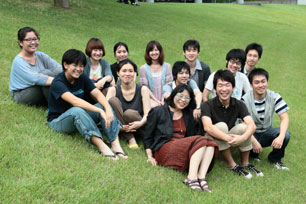Mutsumi Imai, Professor, Faculty of Environment and Information Studies
Cognitive Science of language and learning
Uncovers the mechanism of learning from the standpoints of cognitive science and brain science to figure out better education.

The main theme of Imai laboratory is to elucidate the process of how children acquire language and the mechanism behind this process. What kind of knowledge do we have about language, and how do we store such memories in our brain? Furthermore, how does the brain work when we are trying to understand words that we hear and say what we want to say. Also, how do children learn language? In my lab, we work on these issues using experimental techniques of cognitive psychology and brain science. Particularly, we put emphasis on the relation between cognitive development and language acquisition. Children develop their cognitive function such as concept through language learning, but at the same time, they become capable of learning language because they have already acquired the fundamentals of cognition. As such, language and cognition are related interactively, supporting and boosting each other, and we call this "bootstrapping". Just as we lace up a boot one hook after another, children develop their lexicon and at the same time establish concept. I want to uncover this mechanism. At the same time, I think an important point of this process to focus on is how unique it is to each language such as Japanese and English, and how universal it is among all languages. Therefore, we conduct joint researches with universities and research institutions in the U.S., England, Hong Kong, Switzerland and Holland.
Another important research theme in my lab is "learning and education". In a way, language acquisition can be representing how we learn all kinds of things. Using knowledge obtained from basic research of language acquisition, we study the cognitive process of human being's learning in general, and we try to figure out how we can apply this in education. As an attempt, we hold workshops regularly with elementary school teachers.
Student's Voice
Rhuichi Suzuki, Fourth-year Student,
Faculty of Policy Management
Studying human beings scientifically through activity of the heart and the brain
Although I belong to the Faculty of Policy Management, I study in this laboratory because at the Shonan Fujisawa Campus, we are given the flexibility to take courses of other faculties.
In this lab, we work in two different groups, the language group and education group, and we study about language and concept learning or changes in brain activity in learning and growing, through electroencephalogram recording experiments and fieldwork. Cognitive science is a very interesting and important science when it comes to exploring the process of human growth and the roots of human intellect. Although it is a difficult science, I find it interesting because we cover diverse themes such as psychology, language and education, and because we get involved in science from a multidimensional standpoint, transcending academic boundaries. Prof. Imai's comments on students' presentations make me realize every week the depth of science.
*Position titles, etc., are those at the time of publishing.
